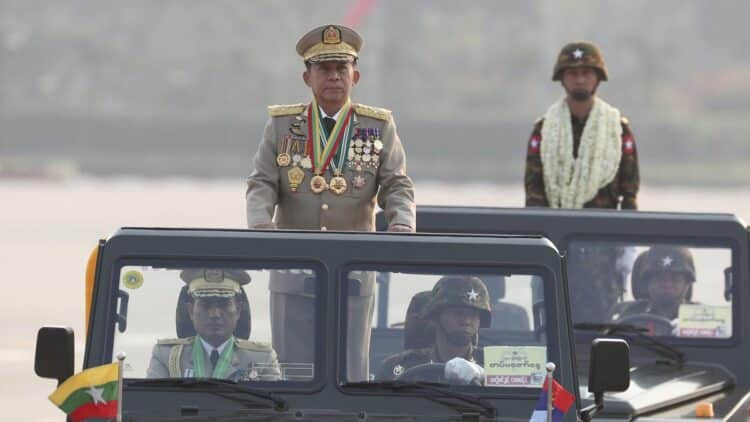
Senior Gen. Min Aung Hlaing (left), head of the military council, inspects officers during a parade to commemorate Myanmar’s 78th Armed Forces Day in Naypyitaw, Myanmar, on March 27, 2023.
| Photo Credit: AP
Flanked by tanks and missile launchers, Myanmar’s junta chief Min Aung Hlaing on March 27 vowed no let up in a crackdown on opponents and insisted the military would hold elections, weeks after admitting that it did not control enough territory to allow a vote.
Myanmar has been in turmoil since the military deposed Aung San Suu Kyi’s civilian government two years ago after making unsubstantiated claims of electoral fraud.
Explained | The legal battles of Aung San Suu Kyi since the 2021 coup in Myanmar
The putsch sparked renewed fighting with ethnic rebels and birthed dozens of anti-junta “People’s Defence Forces” (PDFs), with swathes of the country now ravaged by fighting and the economy in tatters.
The military will take “decisive action” against its opponents and ethnic rebels supporting them, Min Aung Hlaing told an audience of around 8,000 service members attending the annual Armed Forces Day parade in the military-built capital Naypyidaw.
“The terror acts of National Unity Government (NUG) and its lackey so-called PDFs need to be tackled for good and all,” he said, referring to the “National Unity Government,” a body dominated by ousted lawmakers working to reverse the coup. “The junta would then hold “free and fair elections” upon the completion of the state of emergency,” he said.
Last month, the military announced an extension of a two-year state of emergency and postponement of elections it had promised to hold by August, as it did not control enough of the country for a vote to take place. “Serenity and stability are vital” before any election could go ahead,” Min Aung Hlaing told the parade.
Planes flew overhead spewing smoke in the yellow, red and green of the national flag and a flight of five Russian-made Sukoi Su-30 jets roared past. Women lined the streets leading to the parade ground to garland marching soldiers with flowers, images on state media showed.
Armed Forces Day commemorates the start of local resistance to the Japanese occupation during World War II, and usually features a military parade attended by foreign officers and diplomats.
Two years after the coup, the situation in Myanmar is a “festering catastrophe”, United Nations human rights chief Volker Turk said earlier this month, adding that the military was operating with “complete impunity”. More than 3,100 people have been killed in the military’s crackdown on dissent since the coup, according to a local monitoring group. More than a million people have been displaced by fighting, according to the UN.
In December, the junta wrapped up a series of closed-court trials of Suu Kyi, jailing her for a total of 33 years in a process rights groups have condemned as a sham.
















